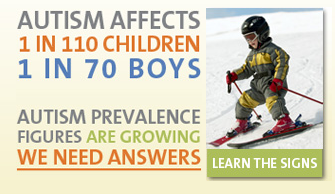 From the Autism Speaks website
From the Autism Speaks website
Sallie Tisdale has an article in Harper's (subscribers only) this month about her autistic daughter. There's an element of forestalled explanation to it; yes, she said "daughter."
My daughter, Annie, still lives with us. She is twenty-six now and at the moment is sitting on the porch, looking out at the street. Soon she will come in and pace for a while, her head down. Later she will read the first few pages of a book—the same book, the same pages, that she read last week and the week before, and will read again tomorrow.
"Autistic son" delivers 175,000 results on Google. "Autistic daughter," just 31,000. People are not sure why more boys than girls are found to have autism. Epidemiologically, the ratio is supposed to be about 3.6 boys to one girl.
It's known that girls can learn to mask some of the effects of autism more easily than boys, so it's possible that they are under-diagnosed in general. Studies show that hallmarks like "language deficits, tantrums, and aggression are all less common in girls than boys in the general population." A British researcher raises the specter of a shadow population of "shy" girls who like to keep lists and count calories (even to anorexia).
Tisdale's story is a primer on autism's variability, and its effects on everyone who struggles with it, including caregivers. Tisdale recounts the lifelong challenge of it: the official optimism with which her daughter was handed off as she finished school, the time her daughter started hallucinating and had to be given antipsychotic medication. Writes Tisdale:
Long-term studies of people with autism are not reassuring. Autistic adults generally read poorly, have few math skills. Very few go to college, are employed, or lead independent lives. The majority say they have no friends....
(more)



Most Recent Comments